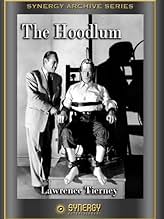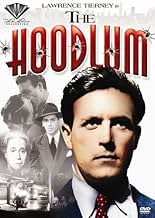Agrega una trama en tu idiomaParoled sociopath and career criminal Vincent Lubeck betrays his family's trust when he masterminds a complex armored car robbery.Paroled sociopath and career criminal Vincent Lubeck betrays his family's trust when he masterminds a complex armored car robbery.Paroled sociopath and career criminal Vincent Lubeck betrays his family's trust when he masterminds a complex armored car robbery.
- Dirección
- Guionistas
- Elenco
- Christie Lang
- (as Ann Zika)
- Old Man
- (sin créditos)
- Parole Officer W.D. Allen
- (sin créditos)
- Gang Member
- (sin créditos)
- Police Officer
- (sin créditos)
- Guard
- (sin créditos)
Opiniones destacadas
In this sequel to Nosseck's remarkable Dillinger (1945), real life tough guy Lawrence Tierney reprises his role of a scowling, unredeemable thug (he also appeared in the same director's equally hardboiled Kill or Be Killed (1950). The result is another tight and tough little film, if not quite on the same level. The main reason for this is a plot that's less convincing than Yordan's was back in 1945 when the real Dillinger's famously dramatic life provided excellent inspiration. Yordan, who went on to script such projects as El Cid, was plainly more of an artist than Neumann and Tanchuk, providing the story here. Events are more predictable the anti-hero is even provided with a sentimental death bed scene to weep his belated crocodile tears. Fortunately Tierney plays this final pay off with little sentimentality, even hiding his face rather than letting the audience see him weaken'. As Lubeck, the hoodlum just out from jail finding life too dull working in his brother's pump station, Tierney is once again excellent, up to and including the inevitable denouement. His determined unrepentance creates a thrusting charisma which both Rosa (his brother's girl, whom he briefly seduces, impregnates and discards), the bank manager's secretary and the audience find hard to ignore. As an actor Tierney can manage a cruel arrogance even when working a petrol pump, while Lubeck's cynical disassocation from his family makes him seem a very modern.
Interestingly, almost half the running time of the film has elapsed before he commits his first crime, or even fires a shot. For the rest of the time the hoodlum is brooding, contemplating the raw deal he has been handed, feeling as imprisoned by his humdrum job as no doubt millions of others did (and do) at the time. The difference is that he wants to reach for his big break in dramatic and violent fashion as he has it `all figured out now'. Its the heist he has planned, with the desperate aftermath, occupies the remainder of the film.
Ironically it is Lubeck's mother whose tears soften the heat of his parole board, thereby releasing her vicious son back into circulation. By the end, along with society, she inevitably regrets this decision, but her role in obtaining his release means that, in some respect at least, she is responsible for the anti-social acts he performs. In this light her final scene can be seen as much an act of necessary repentence as it is her reconciliation with reality.
The Hoodlum also boasts a minor first in that Tierney's real life brother Edward appears on screen for the first time, playing Vince's nice-but-dull brother. Despite all his good intentions, he ends up holding a gun on his sibling before literally driving him to his death - an event the significance of which frames the main action of the film in flashback, a typical noir conceit. Edward has little of Lawrence's screen presence, although here the novelty of the casting (which recalls the on-screen partnership of the Mitchum brothers in the cult film Thunder Road (1958 )) makes up for some his gaucheness.
Nosseck's muscular, ever hard to see films are overdue for reassessment. His three with Tierney are generally excellent, although hampered by constraints of budget and length. Also recommended is his British black out thriller The Brighton Strangler, more atmospheric than one might expect, and directed in the same vintage year as Dillinger.
Leading man Lawrence Tierney scowls through his part. His best scenes occur near the end, especially with mother Golm. Though theatrical, Golm performs most passionately for director Max Nosseck. Edward Tierney is Lawrence's real-life brother and is okay his first featured role. They are interesting in the bracketing car scene which opens the story with flashbacks. While Ms. Roberts is a pushover, a couple of other women assert themselves. All things considered, the best part of this unassuming crime drama is the story/screenplay, well-written by Sam Neuman and Nat Tanchuck. They make the characters more interesting than they are played – and "the city dump" is an artfully used metaphor. The main caper, involving the bank and a nearby mortuary, is nicely staged.
****** The Hoodlum (7/5/51) Max Nosseck ~ Lawrence Tierney, Edward Tierney, Lisa Golm, Allene Roberts
The film stars Lawrence Tierney and one of his real-life brothers. For some very, very fascinating reading, read up on Tierney's life--he was an incredibly dangerous sort of guy--and a lot like the sociopathic character he played in this film. Now that Tierney has passed away, I have no trouble saying this...otherwise I'd keep my mouth shut, as even as an elderly guy he was quite the unpredictable terror! But, I should point out, that because Tierney was such a screwball, he was able to play some of the most menacing and convincing criminals in noir films such as "Born to Kill" and "Reservoir Dogs".
Lawrence Tierney plays an angry man who was just paroled. Instead of learning from his mistakes, he has an incredibly bad attitude and blames everyone for his problems...everyone but himself. It's obvious that despite his family trying to help him go straight, this hoodlum is determined to return to a life of crime. After all, in his mind the world owes him something and working hard at a real job is for suckers! This unrelenting badness made the character terrific and dark even by film noir standards. He destroys his brother's girlfriend, kills with no compunction and attacks everyone around him--making him very memorable. As a result, the film takes a rather ordinary story idea with a small budget and makes it much more. It's gritty and far more realistic than a typical film of the era--and well worth seeing for fans of noir.
If you do see the film, some particularly noteworthy scenes are Tierney slapping a woman as well as the final scene between him and his horrified mother and brother. Great stuff! By the way, in an interesting bit of casting, Lawrence Tierney's real-life brother, Edward, plays his brother in the film as well!
Released, he moves back home. He's reluctantly offered, and reluctantly takes, a job at the filling station owned by his straight-arrow sibling (and real-life brother Ed Tierney, later Tracy; actor Scott Brady was a third brother). But, apart from a personal campaign to prove that the customer is never right, Tierney's main interest is getting into the pants of the bank manager's secretary who works across the street so he can plan his next big job. (He also manages, in his off-hours, to rape and impregnate his brother's fiancée, driving her to suicide.) The rest of the movie recounts the brutal bank heist, which is synchronized with a phonily arranged funeral....
The Hoodlum was made at a time when Tierney's off-screen roughhousing was starting to make him, after striking roles in Born to Kill and The Devil Thumbs A Ride, an undesirable in Hollywood. It's a short, stripped-down, starvation-budget programmer. Still, it shows those ragged edges that more artifice might have smoothed away (the rape and pregnancy are startling for their era); a few plot strands seem like distant echoes of the incomparably superior White Heat, of two years earlier. The most noteworthy aspect of The Hoodlum's script is that Tierney undergoes no character development whatsoever: He starts out as a cur and dies like a dog.
The point is that here Tierney plays the brooding violent seemingly tormented hoodlum Vincent Lubeck, into far more nefarious stuff than Tierney ever was, but Tierney has the titular character's mood and mentality down pat. VInce is somewhat enigmatic with few words. It is with posture and factial expressions that you come to know this character.
The first part of the film is almost in documentary style. It talks about Vincent's ride through the revolving door of the criminal justice system with his crimes elevating in gravity with his age. Finally at age 25 he is sentenced to 5-10 in the pen for armed robbery. At his parole hearing after 5 of those 10 years, the parole board can't think of why they should loose this guy on the public. But then his gray haired mama enters and after she slings enough chicken soup, cliches, and mixed metaphors at the board she apparently convinces (confuses???) the board into letting Vince go.
But you might as well meet the new VInce, same as the old Vince. He feels the world owes him something because of his impoverished upbringing, living next to the city dump as a kid. But his little brother (and this actually IS Tierney's little brother folks) doesn't seem to have any of Vince's hardness, is enterprising, and has opened a gas station and gives Vince a job, which he needs to stay out on parole.
But Vince is busy eyeing the things he can't have and that he wants. One is his kid brother's fiancee, Rosa. The other is the contents of the bank across from the gas station where he works. And this is where he plans a rather intricate bank hold-up. This is where low budget Eagle-Lion excelled, what they couldn't afford in really big name stars - TIerney is the only one in this film - they spent on rather clever plots.
Tierney gets to show a bit of range here. He even shows fear and regret, although in small doses. And the end of the film is quite ironic. I would recommend this little film.
¿Sabías que…?
- TriviaA new print has been made of this film which received its premiere at the Motion Picture Academy of Arts and Sciences on 21 May 1999.
- ErroresWhen the taxi pulls into the gas station during the dry run, about 35 minutes into the film, a shadow of the boom microphone is visible on the pavement, then the side of the car as it pulls up to the pumps.
- Citas
Mrs. Lubeck: Take a breath, Vincent. Go ahead. Smell! You can smell fresh air here. Not like where we used to live by the city dump. Every time the wind changed... my!... the smell! And Papa running around all day yelling, 'Keep the windows closed! Keep the windows... '
Vincent Lubeck: Stop it, Ma! Keep the windows closed? What was the use? The stink came through them anyhow into all the corners of your lungs... your skin! Even if you took a bath every day, the stink would still stink! Our playground, where we picked up a few pieces of junk to get spending money. A rotten stink! Even now we're not too far away from it! But you wait! I've got ideas. I'll get plenty of money! Yeah, dough! That's the only thing that'll ever cover up the stink of the city dump!
- ConexionesEdited into Haunted Hollywood: The Hoodlum (2016)
Selecciones populares
- How long is The Hoodlum?Con tecnología de Alexa
Detalles
- Tiempo de ejecución1 hora 1 minuto
- Color
- Mezcla de sonido
- Relación de aspecto
- 1.37 : 1
Contribuir a esta página





























